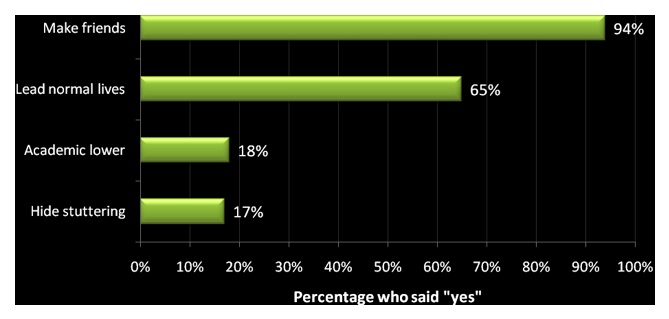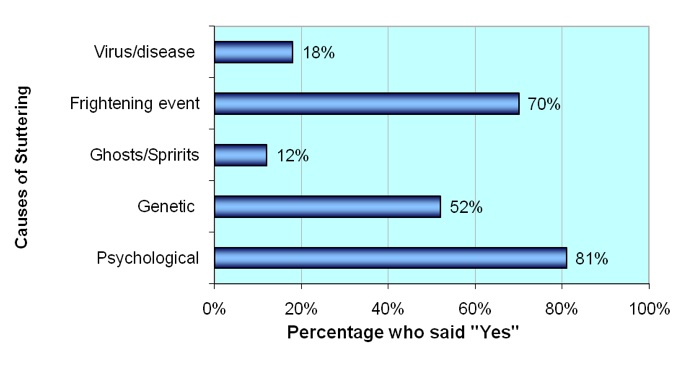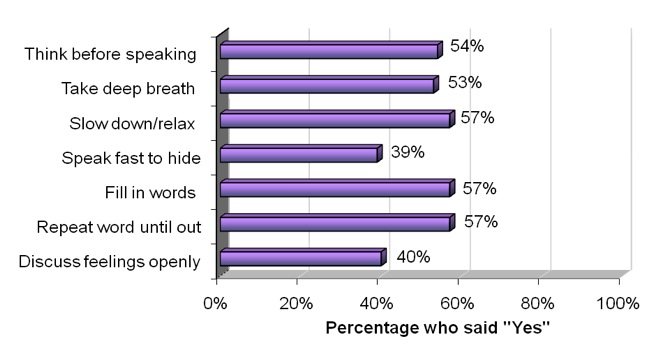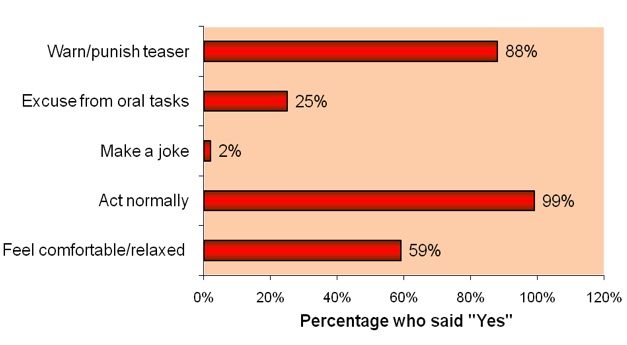Stuttering and Teachers in Kuwait: The Story So Far
 |
About the presenter: Fauzia Abdalla, Ph.D., CCC-SLP, S-LP(C) is a certified speech-language pathologist and an Assistant Professor at Kuwait University, Kuwait. Dr. Abdalla earned her Masters and Ph.D. degrees in Communication Disorders from McGill University, Canada. Fauzia has worked with children and adults who stutter in Canada, U.S.A, Kenya and Saudi Arabia. Currently, she teaches courses in child language disorders and stuttering and is actively engaged in several collaborative research projects on fluency disorders. |
 |
About the presenter Ali Al-Saddah is a 3rd Year student studying a Bachelor of Health Sciences (Hearing & Speech) at the University of Sydney, Australia. |
Stuttering and Teachers in Kuwait: The story so far
by Fauzia Abdalla and Ali Al-Saddah
Kuwait
Stuttering and Teachers in Kuwait: The story so far Fauzia Abdalla and Ali Al-Saddah
Introduction:
The State of Kuwait is a small country located in the north-east corner of the Arabian Peninsula. It has a population of approximately 3.1 million, a third (1 million) of which are Kuwaiti citizens. Kuwait's official language is Arabic there is a literacy rate of 93% due to widespread government support for the educational system including the sending of students to study abroad.
The field of communication disorders is still emerging in Kuwait. The Department of Communication Sciences in Kuwait University is the only program that offers a degree in Speech Language Pathology, having graduated its first batch of students in June 2008. In addition, the health sector of the Kuwaiti government is attempting to increase the existing speech and hearing treatment services. Speech treatment facilities are currently available at government clinics and special education schools. There is a shortage of professionals who can serve individuals with various communication disorders. For example, mainstream schools have no access to speech language pathologists.
Given that services in communication disorders in Kuwait are still emerging, there is not enough information about stuttering in Kuwait. For example, we do not know the prevalence or incidence of stuttering in the country. Nevertheless, it is encouraging to see some studies being conducted to determine public knowledge and attitudes towards stuttering in Kuwait and various other countries in the region. In one such study, 424 Arab parents of school-age children across Kuwait were surveyed and found to have limited knowledge about stuttering (Al-Khaledi, Lincoln, McCabe, Packman, and Alshatti, 2009).
Kuwaiti persons who stutter: Their personal encounter with teachers
To get an insider's view, we approached three individuals who stutter and asked them to describe their experiences with teachers while attending school in Kuwait.
The first is Latifa, a teenager who attends Middle school in Kuwait.
The second is Eissa who has graduated from high school and is now attending university in Kuwait.
The last interviewee is Munira, an adult who stutters. Here's what she wrote when asked for her experience:
Some teachers pretended not to see my hand raised; some even had the nerve to tell me that because of my situation I had to ask after class or at break time so I would avoid the embarrassment of stuttering in front of my classmates, falsely pretending to be concerned with my feelings. As a result, I stopped communicating with most of my teachers.
There were no speech therapists in school, only psychotherapists who knew nothing about my situation, could not relate to my experiences as a PWS or to stuttering in general. Annoyingly, the therapists would always form the opinion that my stutter was a result of a traumatic childhood experience causing me to develop low self-esteem and which to them was the primary cause for stutter. As a matter of fact, I had the opposite experience; had the best childhood anyone can dream of and my strong self-confidence always exuded itself in my personality.
No one doubts the important role teachers play in the educational and psychological well-being of the younger generation. However, it is worrisome to read about the personal struggles recounted by Latifa, Eissa, and Munira. Why did some teachers react so negatively to stuttering? Did lack of awareness shape the teachers' attitudes to the point that they would discourage a students' right to communicate? The study we will describe was motivated by the challenges confronted by individuals like Latifa, Eissa and Munira with teachers.
Teachers and Pre-service Teachers in Kuwait: Perceptions of Stuttering
Teachers' beliefs about stuttering can influence their reactions to stuttering in the classroom. Most teachers know little or nothing about stuttering which in turn can force them to assess people who stutter negatively (Heite, 2000). Results of this discrimination on classroom interaction can put the student who stutters at a real disadvantage (Heite, 2000).
At present, there are no studies that have investigated Arab teachers' perceptions toward students who stutter. This study attempts to fill this void by exploring knowledge and beliefs about stuttering in teachers working in Kuwaiti schools.
Participants
Data from 100 participants (52 males and 48 females; age ranging from 20 years to over 50) were analyzed. 52 were Public School teachers (Middle School Grades) and 48 were pre-service teachers enrolled in the College of Basic Education, Kuwait. All participants were Arab (23 Egyptians, 57 Kuwaitis, 7 Saudis and the remaining teachers were from Jordan, Lebanon, Tunisia, Morocco and Mauritania). 51 participants reported that they have a friend or a relative who stutters. Of the 52 school teachers, at least 46 indicated that they had taught a student who stutters at some point in their career.
Survey Content
The instrument consisted of an Arabic adaptation of parts of the Public Opinion Survey of Human Attributes Inventory [POSHA-E] St Louis, K. O. (2009), a global instrument to measure public attitudes about stuttering. Additional questions regarding practices of teachers inside the classrooms were added to the survey. The questionnaire began with background information such as the age, gender, school, grade level, whether s/he stutters or knows a person who stutters. Participants then responded to each question on a scale of 1 to 3 (yes, no or not sure).
Results and Discussion
Figure 1. Participants' perceptions about PWS

As can be discerned from Figure 1, a substantial percentage of teachers believe that students who stutter can make friends. However, not as many think that PWS can lead normal lives (65%). Only 18% were of the opinion that students who stutter display a lower level of academic performance in school.
Although only 17% of the respondents believe that PWS should try to hide their stuttering, Munira's experience portrays a different picture. When Munira said "some even had the nerve to tell me that because of my situation I had to ask after class or at break time so I would avoid the embarrassment of stuttering in front of my classmates" ...was this a suggestion that she hide her problem?
Figure 2. Causes of stuttering as perceived by the respondents

Figure 2 portrays that a relatively high percentage of the teachers believe that stuttering is caused by psychological problems (81%) or a very frightening event (70%). Approximately half of the participants attribute the problem to genetic inheritance. A few educators think a virus/disease or ghosts can cause stuttering in their students.
Munira speaks to the issue of causes when she recounts that psychotherapists at her school "would always form the opinion that my stutter was a result of a traumatic childhood experience." Teachers in the survey too, appear to link psychological or some frightening event to the stuttering.
Figure 3. Participants' tips to help a person who stutters.

In Figure 3, about half of the educators report that they would advise a student who stutters to: a) take a deep breath, b) think before speaking , c) slow down and relax or d) repeat the word until he or she gets it out. 57% said they would fill in the student's words and 39% believe it would be helpful if the student "speaks fast so the listener would not get a chance to notice." On the other hand, only 40% of the educators would encourage the student to discuss his/her feelings about stuttering openly (with classmates).
Munira and Latifa appeared to be disturbed by the fact that their teachers would not allow them to discuss their ideas (feelings) freely. Often they would be interrupted or ignored when they persisted in voicing their views. Students like Munira, Latifa and Eissa have at least half of their teachers advising them to relax, speak faster to hide the stuttering problem or worse hinting that they keep their feelings of frustration to themselves.
Figure 4. Participants' reaction to the student's stuttering

As for their reactions, Figure 4 shows that 99% of the teachers would "act as if the person was talking normally" and would hardly ever make a joke about their stuttering. Many would deal with other students who make fun or tease the PWS by warning or punishing them (88%). Interestingly, only 25% of the participants believe it would be helpful if PWS is excused from class discussions or oral tasks. Around 59% acknowledge feeling uncomfortable when a student stutters.
Pressure is a recurring theme in all three interviews - Munira, Latifa and Eissa remark that some teachers do not give them time to speak freely. As for the survey, a high percentage of the teachers believe they are acting normally when talking with a student who stutters but some of the realities perceived by PWS like Munira and Latifa say otherwise. If indeed 99% of the teachers do so, why did 41% indicate that they do not feel comfortable or relaxed when talking with a PWS? Moreover, excusing a student who stutters from oral tasks was a view held by only a quarter of the participants. In the case of Latifa and Munira, teachers found other ways to exclude them from verbal discussion such as ignoring their raised hand and passing on to the next student.
Summary of Findings:
It is important to determine public knowledge and attitudes towards communication disorders especially in a country where that field is still emerging. Since teachers play an important role in the education of the younger generation, a survey was conducted to determine their attitudes to PWS as well as personal experiences from PWS during their school years. The survey produced many results that contradicted some of the findings from the personal experiences. In general, teachers in Kuwait require awareness and information about stuttering and how to deal with PWS. 60% of teachers would feel uncomfortable when confronted with a PWS. Also, over half of the teachers responded that they would fill in words for the PWS. These are examples of how teachers are unaware of the right way in dealing with PWS and ways they would aid them during class.
Conclusion:
In sum, we gained essential insights from Kuwait's story of stuttering and teachers by examining two types of information: a) subjective, qualitative data in the form PWS' personal experiences with teachers in Kuwaiti schools and b) quantitative analyses of surveys completed by educators and pre-service teachers. Despite some positive trends in some of the teachers' perceptions and knowledge of stuttering, there are still areas that are in dire need of awareness. Some of the teachers' lack of adequate knowledge about stuttering clearly affected the school lives of the three (former) Kuwaiti students who were generous enough to share their experiences with us. We hope this paper serves as a spur for disseminating information about stuttering in schools across Kuwait.
References: Al-Khaledi, M., Lincoln, M., McCabe, P., Packman, A. and Alshatti, T. (2009). The attitudes, knowledge and beliefs of Arab parents in Kuwait about stuttering. Journal of Fluency Disorders, 34, 44-59.
Heite, L. (2000). Icelandic teachers' attitudes towards stuttering and classroom decision making. Paper presented at the International Stuttering Awareness Day Online Conference (ISAD3). http://www.mnsu.edu/comdis/ISAD3/papers/heite/heite3.html
St Louis, K. O. (2005). A global project to measure public attitudes about stuttering. The ASHA Leader, 22, 2-13.
Acknowledgment:
We would like to thank the following individuals for helping make this paper possible:
a) The three Kuwaiti persons who stutter - Munira, Eissa and Latifa for their time and insights.
b) The school teachers and students at the College of Basic Education for serving as participants and the Ministry of Education in Kuwait for giving permission to run the study.
c) Ken St. Louis for generously sharing POSHA.
d) Latifa Al-Salmi, Marwa Al-Rahmani and students at the CSL Dept, Kuwait University for assistance with survey design and data collection.
e) Dalal Al-Ali for transcribing Latifa and Eissa's interviews.
f) Latifa Al-Ajmi and Ali's friends for comments on an earlier draft.
Submitted: August 29, 2009

